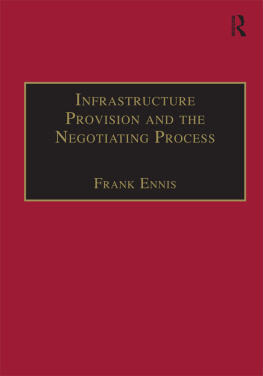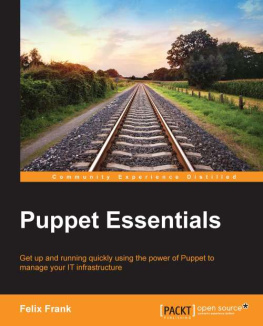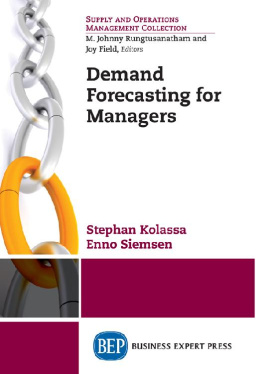Frank Ennis - Infrastructure Provision and the Negotiating Process
Here you can read online Frank Ennis - Infrastructure Provision and the Negotiating Process full text of the book (entire story) in english for free. Download pdf and epub, get meaning, cover and reviews about this ebook. year: 2003, publisher: Ashgate, genre: Romance novel. Description of the work, (preface) as well as reviews are available. Best literature library LitArk.com created for fans of good reading and offers a wide selection of genres:
Romance novel
Science fiction
Adventure
Detective
Science
History
Home and family
Prose
Art
Politics
Computer
Non-fiction
Religion
Business
Children
Humor
Choose a favorite category and find really read worthwhile books. Enjoy immersion in the world of imagination, feel the emotions of the characters or learn something new for yourself, make an fascinating discovery.
- Book:Infrastructure Provision and the Negotiating Process
- Author:
- Publisher:Ashgate
- Genre:
- Year:2003
- Rating:3 / 5
- Favourites:Add to favourites
- Your mark:
- 60
- 1
- 2
- 3
- 4
- 5
Infrastructure Provision and the Negotiating Process: summary, description and annotation
We offer to read an annotation, description, summary or preface (depends on what the author of the book "Infrastructure Provision and the Negotiating Process" wrote himself). If you haven't found the necessary information about the book — write in the comments, we will try to find it.
Frank Ennis: author's other books
Who wrote Infrastructure Provision and the Negotiating Process? Find out the surname, the name of the author of the book and a list of all author's works by series.
Infrastructure Provision and the Negotiating Process — read online for free the complete book (whole text) full work
Below is the text of the book, divided by pages. System saving the place of the last page read, allows you to conveniently read the book "Infrastructure Provision and the Negotiating Process" online for free, without having to search again every time where you left off. Put a bookmark, and you can go to the page where you finished reading at any time.
Font size:
Interval:
Bookmark:
Frank Ennis
Department of Environmental Planning
University of Strathclyde

2 Park Square, Milton Park, Abingdon, Oxon OX14 4RN
711 Third Avenue, New York, NY 10017, USA
Product or corporate names may be trademarks or registered trademarks, and are used only for identification and explanation without intent to infringe.
Infrastructure provision and the negotiating process. -
1. City plannig 2. Infrastructure (Economics) - Finance
3. Negotiation
I. Ennis, Frank
307.1'216
Infrastructure provision and the negotiating process / edited by Frank Ennis.
Includes bibliographical references.
ISBN 978-0-7546-1243-8 (alk. paper)
1. City plannig. 2. Infrastructure (Economics) 3. Real estate development. 4. Real
estate developers. 5. Negotiation. I. Ennis, Frank. II. Series.
307.1'216--dc21
ISBN 13: 978-1-138-27741-0 (pbk)
tomalty@fred.surp.queens.u.can
Infrastructure Provision and the Urban Environment
Font size:
Interval:
Bookmark:
Similar books «Infrastructure Provision and the Negotiating Process»
Look at similar books to Infrastructure Provision and the Negotiating Process. We have selected literature similar in name and meaning in the hope of providing readers with more options to find new, interesting, not yet read works.
Discussion, reviews of the book Infrastructure Provision and the Negotiating Process and just readers' own opinions. Leave your comments, write what you think about the work, its meaning or the main characters. Specify what exactly you liked and what you didn't like, and why you think so.










